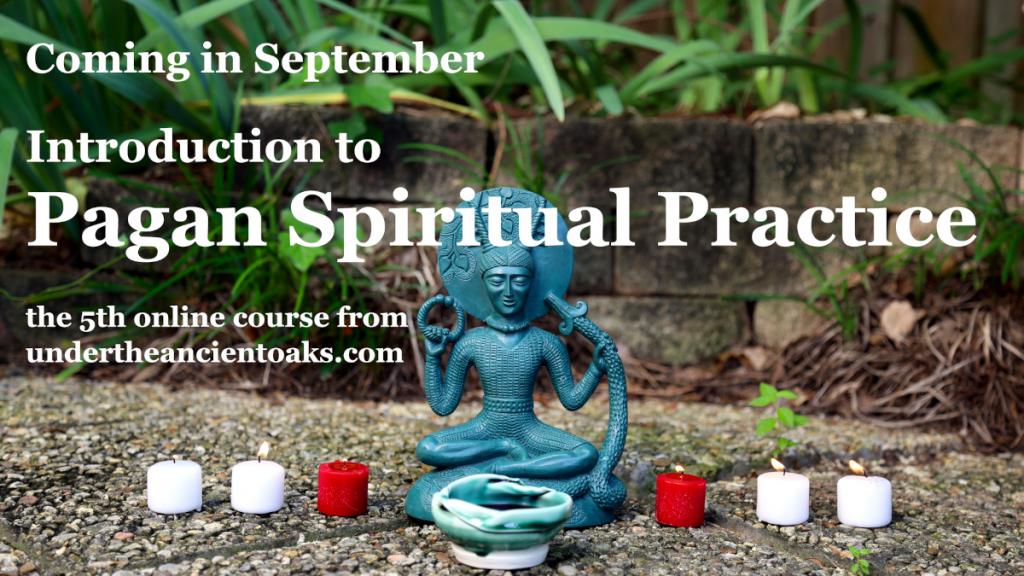As difficult as things have been in recent months, I shudder to think how difficult they would be if I didn’t have a regular spiritual practice.
Now, there are two misconceptions about spiritual practice (and spiritual people) in our mainstream society. The first is that if you’re truly spiritual and if your practice is truly devout, you’ll be protected by your God or Gods and you’ll never experience anything bad. And conversely, if you do experience something bad, it means you’ve “sinned” and “fallen out of grace.” These false and harmful ideas come from Calvinism – they have no place in our Pagan and polytheist religions… or in any other helpful religion.
The second misconception is that if you’re truly spiritual, bad things won’t bother you. They may happen, but you’ll be so “spiritual” that you’ll transcend it all. This is spiritual bypassing. That term is usually connected to the New Age movement, but my Baptist father used to complain about people who were “so heavenly minded they’re no earthly good.”
Good, robust, regular spiritual practice doesn’t excuse us from the harsh realities of life. But it does equip us to better deal with those realities and to keep them from derailing our lives.
Here’s what a regular spiritual practice can do for you.
It helps you keep moving
The key to regular spiritual practice is the regular part. When you do something every day, every day, every day, it becomes part of your life. It provides stability and familiarity even in times that are strange and disruptive.
Recently I’ve observed a Twitter argument about discipline, with some practitioners emphasizing the need to be disciplined in our practices, and others arguing that discipline is bad because the alt-right makes such a big deal about it.
The alt-right – including the Pagan alt-right – overemphasizes discipline because they value hierarchy over freedom and conformity over diversity. But that doesn’t diminish the value of discipline – of doing the right things consistently even if you don’t feel like doing them.
Pray, meditate, make offerings, observe the changing seasons. This is what we do. This is who we are. We do these things when they’re easy, and we do them when they’re hard.
And in doing so, we keep moving when it would be all too easy to quit.
It maintains our spiritual relationships
All relationships require time and attention – they require work. This is true for our families, our neighbors, our co-workers, and our co-religionists. And it’s true for our Gods, ancestors, and other spiritual allies.
My nightly prayers and my weekly offerings keep me connected to Cernunnos, to the Morrigan, and to the other deities I work for and with. They help me to hear Their voices over the roar of daily life.
My Gods have work They want me to do – spiritual practice keeps me focused on that work. My ancestors survived circumstances worse than mine – spiritual practice helps me draw on their strength. I share the land with the spirits of this place – spiritual practice reminds me that this is their home too.
None of these relationships “fix” the things that are broken in my life and in our world. But they let me know that I’m not in this alone, and that makes a huge difference.
Reinforce your highest values
Some values are so obviously the right thing we can’t imagine why anyone would do anything else. But most of our values are learned from schools and churches, from watching others, and absorbed from the mainstream culture.
That’s the same mainstream culture that acts as though might makes right, that believes the only worth anyone or anything has is their monetary worth, that says there’s only one God and acts like there are no Gods, and that finds its identity in mindless entertainment.
We have to live in the mainstream world (unless you want to become a hermit, which I don’t recommend, even though it’s getting more and more attractive all the time). The key is to reinforce our Pagan and polytheist values: hospitality, reciprocity, perseverance, heroism, and especially building a better world for those who come after us.
Regular spiritual practice keeps our Pagan values at the center of our attention – where they belong.
Spiritual practice helps us accept reality
This likely seems counterintuitive to our atheist friends, but it’s true nonetheless. The more we develop a regular practice, the stronger our spiritual relationships and the stronger our values, and the greater our appreciation of facts and truth. That makes us far less likely to get tied up in conspiracy theories, mindlessly buy into advertising schemes, or take politicians at face value.
This has been critically important for me, particularly over the past 10 months or so. And I’m not just talking about the Covid deniers and the fools who think Trump won the election.
The anchor provided by regular spiritual practice reminds me that nothing in life is risk-free. Some risks are necessary and others aren’t. Some risks are good bets and others are very bad bets. And when you have very important things to do, you figure out how to do them in a way that maximizes your odds of a favorable outcome.
Spiritual practice helps us deal with the current reality
We’re still in the worst pandemic in over a century. I genuinely thought we would be done with it by now, but the Delta variant – enabled by those who refuse to be vaccinated – has other ideas. We’ll never be completely done with Covid-19 (the Spanish Flu is still around) but at some point the infection rate will subside… I just have no idea when that will be. Meanwhile, we do what we have to do to protect ourselves and those around us.
And also, this is Tower Time. I tend to focus on the spiritual and Otherworldly aspects of Tower Time, but the this-world aspects are here for all to see, including the pandemic, climate change and its impacts, and the decline of the Anglo-American empire.
I taught an online class on Tower Time earlier this year. In the final module, I asked the participants “what’s worth fighting for?”
Regular spiritual practice reminds us what’s worth fighting for – and what isn’t.
Coming in September: Introduction to Pagan Spiritual Practice – A Polytheist Approach
Over the years I’ve blogged a lot about spiritual practice. Here are a few of the more recent posts:
Maintaining a Spiritual Practice in Difficult Times (February 2021)
Beginning Spiritual Practices and Studies (May 2020)
Learning to Pray from a Pagan Perspective (May 2020)
Meditation: A Pagan Approach to a Universal Practice (January 2018)
7 Spiritual Practices for Difficult Times (May 2017)
I thought I had said all I needed to say about the subject. But in the post-class survey for the Tower Time class, by far the most frequent request for a future class was devotion. If I include ontology, theology, and ecstatic practices, spiritual practice was an overwhelming majority.
So the next Under the Ancient Oaks online course will be “Introduction to Pagan Spiritual Practice: A Polytheist Approach.” It will cover topics like altars and shrines, prayer, meditation, offerings, grounding and energy work, building your own liturgical calendar, and more.
Look for more details when Module 0 (the introduction and syllabus module, which is free to all) goes up next Tuesday.




















